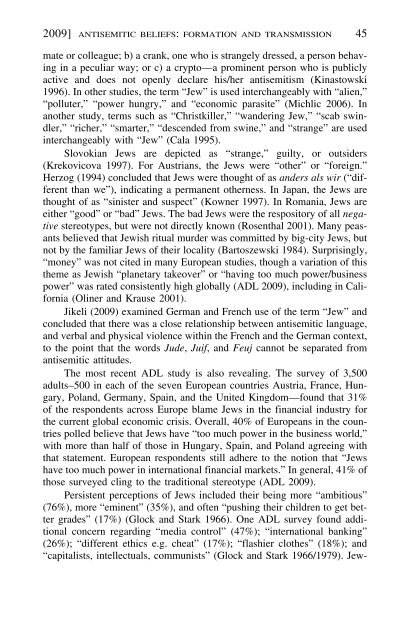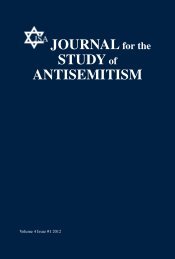Antisemitism as a Specific Phenomenon - Journal for the Study of ...
Antisemitism as a Specific Phenomenon - Journal for the Study of ...
Antisemitism as a Specific Phenomenon - Journal for the Study of ...
Create successful ePaper yourself
Turn your PDF publications into a flip-book with our unique Google optimized e-Paper software.
2009] ANTISEMITIC BELIEFS: FORMATION AND TRANSMISSION 45<br />
mate or colleague; b) a crank, one who is strangely dressed, a person behaving<br />
in a peculiar way; or c) a crypto—a prominent person who is publicly<br />
active and does not openly declare his/her antisemitism (Kin<strong>as</strong>towski<br />
1996). In o<strong>the</strong>r studies, <strong>the</strong> term “Jew” is used interchangeably with “alien,”<br />
“polluter,” “power hungry,” and “economic par<strong>as</strong>ite” (Michlic 2006). In<br />
ano<strong>the</strong>r study, terms such <strong>as</strong> “Christkiller,” “wandering Jew,” “scab swindler,”<br />
“richer,” “smarter,” “descended from swine,” and “strange” are used<br />
interchangeably with “Jew” (Cala 1995).<br />
Slovokian Jews are depicted <strong>as</strong> “strange,” guilty, or outsiders<br />
(Krekovicova 1997). For Austrians, <strong>the</strong> Jews were “o<strong>the</strong>r” or “<strong>for</strong>eign.”<br />
Herzog (1994) concluded that Jews were thought <strong>of</strong> <strong>as</strong> anders als wir (“different<br />
than we”), indicating a permanent o<strong>the</strong>rness. In Japan, <strong>the</strong> Jews are<br />
thought <strong>of</strong> <strong>as</strong> “sinister and suspect” (Kowner 1997). In Romania, Jews are<br />
ei<strong>the</strong>r “good” or “bad” Jews. The bad Jews were <strong>the</strong> respository <strong>of</strong> all negative<br />
stereotypes, but were not directly known (Rosenthal 2001). Many pe<strong>as</strong>ants<br />
believed that Jewish ritual murder w<strong>as</strong> committed by big-city Jews, but<br />
not by <strong>the</strong> familiar Jews <strong>of</strong> <strong>the</strong>ir locality (Bartoszewski 1984). Surprisingly,<br />
“money” w<strong>as</strong> not cited in many European studies, though a variation <strong>of</strong> this<br />
<strong>the</strong>me <strong>as</strong> Jewish “planetary takeover” or “having too much power/business<br />
power” w<strong>as</strong> rated consistently high globally (ADL 2009), including in Cali<strong>for</strong>nia<br />
(Oliner and Krause 2001).<br />
Jikeli (2009) examined German and French use <strong>of</strong> <strong>the</strong> term “Jew” and<br />
concluded that <strong>the</strong>re w<strong>as</strong> a close relationship between antisemitic language,<br />
and verbal and physical violence within <strong>the</strong> French and <strong>the</strong> German context,<br />
to <strong>the</strong> point that <strong>the</strong> words Jude, Juif, and Feuj cannot be separated from<br />
antisemitic attitudes.<br />
The most recent ADL study is also revealing. The survey <strong>of</strong> 3,500<br />
adults–500 in each <strong>of</strong> <strong>the</strong> seven European countries Austria, France, Hungary,<br />
Poland, Germany, Spain, and <strong>the</strong> United Kingdom—found that 31%<br />
<strong>of</strong> <strong>the</strong> respondents across Europe blame Jews in <strong>the</strong> financial industry <strong>for</strong><br />
<strong>the</strong> current global economic crisis. Overall, 40% <strong>of</strong> Europeans in <strong>the</strong> countries<br />
polled believe that Jews have “too much power in <strong>the</strong> business world,”<br />
with more than half <strong>of</strong> those in Hungary, Spain, and Poland agreeing with<br />
that statement. European respondents still adhere to <strong>the</strong> notion that “Jews<br />
have too much power in international financial markets.” In general, 41% <strong>of</strong><br />
those surveyed cling to <strong>the</strong> traditional stereotype (ADL 2009).<br />
Persistent perceptions <strong>of</strong> Jews included <strong>the</strong>ir being more “ambitious”<br />
(76%), more “eminent” (35%), and <strong>of</strong>ten “pushing <strong>the</strong>ir children to get better<br />
grades” (17%) (Glock and Stark 1966). One ADL survey found additional<br />
concern regarding “media control” (47%); “international banking”<br />
(26%); “different ethics e.g. cheat” (17%); “fl<strong>as</strong>hier clo<strong>the</strong>s” (18%); and<br />
“capitalists, intellectuals, communists” (Glock and Stark 1966/1979). Jew-














